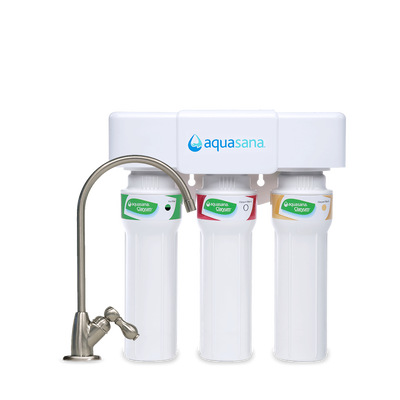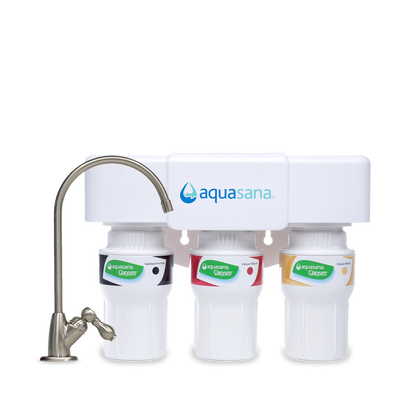When doing a quick Google search for bottled water, you’ll find that there’s an overwhelming number of different brands. With an industry so huge, how does one know which brand bottles the cleanest water? Is it even clean water? And is the bottled water industry just a money-making racket? One has to wonder, with the industry being projected to reach a $334 billion valuation by 2023, according to BusinessWire. 
On your quest for clean water, we’ve compiled information on how bottled water compares to filtered water so you can choose the best drinking water.
Benefits of Drinking Water
Your body is composed of about 60% water, so being well-hydrated is very important as it affects many different parts of your body. Drinking plenty of water is crucial because water not only regulates your internal body temperature, it prevents infection, keeps organs functioning properly, and keeps your cells healthy. Being well-hydrated can also prevent headaches, improve your sleep, and helps you to avoid getting sick.
How much each person needs to be well-hydrated depends on the specific individual. Your daily water intake doesn’t have to just come from drinking plain ol’ water either. You can drink tea, coffee, or make your own fruit-infused water. Don’t wait to drink water until your body needs it and you’re dehydrated – actively prevent dehydration by drinking plenty of water throughout the day!
Analyzing bottled water
For the last 30 years, the bottled water industry has used marketing tactics to lead us to believe that bottled water is the cleanest and healthiest option we have.
Advantages of bottled water
Bottled water is generally cheap, portable, easily accessible, and can be stored in large quantities for use over a prolonged time period in the case of a severe water crisis. Many consider bottled waters’ biggest advantage to be its perceived safety, but this can be a bit misleading as detailed in the section below.
Disadvantages of bottled water
The disposable bottled water industry is huge, with about 60 million plastic bottles being transported and disposed of every day in the U.S. alone. But, despite the industry’s size and importance, it’s notorious for its lack of oversight and is generally considered to be a self-policed industry.
The disposable bottle water industry is huge, with about 60 million plastic bottles being transported and disposed of every day in U.S. alone.”
In fact, the New York Times reported that “bottled water manufacturers are not required to disclose as much information as municipal water utilities because of gaps in federal oversight authority…Furthermore, the FDA does not require bottled water companies to disclose to consumers where the water came from, how it has been treated or what contaminants it contains. In a survey of 188 brands of bottled water released yesterday, the nonprofit Environmental Working Group found only two providing such information about its product to consumers.”
So, despite its perceived safety benefit, bottled water could be more dangerous than tap due to lack of regulation. Not to mention, disposable plastic water bottles are also notoriously bad for the environment. Additionally, it’s been found that bacteria can grow in cracks that form in the plastic bottles — especially if the bottle is stored in a warm area such as a car or garage.
Analyzing filtered water
Switching from bottled water to water filtered at home is one of the most impactful steps you can make to live a healthy life, while saving money and lessening your carbon footprint. While there’s many different options for at home filters, they all work to remove or reduce contaminants from your water.
What is filtered water?
With all the different types of water you can drink, it’s difficult to know exactly what each type is and what it contains. You have tap water, filtered water, purified water, spring water, artesian water, distilled water, and the list goes on.
In a nutshell, filtered water is tap water that has been treated by going through a filtration system to remove contaminants.
Advantages of filtering your tap water
There are many reasons to choose filtered water over bottled water. The most obvious reason is convenience. A quality water filter can easily remove unwanted and harmful contaminants from your tap water without you having to go to the store to buy bottled water. Simply fill a refillable water bottle and you always have clean water to take with you on the go.
Many filters are designed to remove contaminants like chlorine, chloramine, lead, and other bacteria that can make your water smell and taste bad. Even if you’re not immediately smelling or tasting unpleasant water coming out of your faucet, there’s still a chance it could be contaminated.
Filtering your water at home can also save you money. For the average family drinking the suggested amount of water per day, the cost of bottled water can add up rather quickly. If each person in a 4-person family drinks 3 bottles of water a day, from a $10 case of water, you could be spending upwards of $1,000 per year. With the one–time purchase of a water filter, you will save money in the long run while enjoying clean, fresh water.
There really aren’t any health disadvantages of filtering tap water, although the system itself and price of future replacements should be considered. You’ll also want to think about installation complexity, as some water filters such as our Clean Water Machine can simply be plugged in while others, such as our OptimH2O® Reverse Osmosis + Clayrum® may require tools or assistance from a professional.
Types of water filters
There are quite a few ways to get clean, healthy water in your home. We’ve listed a few different types of water filters to help you choose the right option for your home.
Whole House 
Whole house water filters are designed to reduce harmful contaminants in the water that comes out of every faucet in your home. This means cleaner water for drinking, cooking, showering, doing the dishes, and more. While it would be pretty shocking to see someone showering with a bottled water, the whole house filter is giving you clean water to bathe in, without the unnecessary waste of plastic. Since whole house filters like the RHINO® 600,000 Gallons unit reduce up to 97% of chlorine, lead, pesticides, and more, your hair and skin will feel so much healthier! To take the whole house water filter one step further, you can also add on a UV filter to eliminate 99.9% of bacteria and viruses.
Under Sink
Another option for getting clean drinking water is with an under sink water filter. This is a great option if you're wanting to filter the water that comes out of your kitchen faucet. Another reason under sink units are a great alternative to whole house filters is that they are easy to install, and can also be moved from home to home. Our Claryum® 3-Stage Max Flow is one of our most popular under sink water filters, as it by removes more than 97% of chlorine, chloramines, and 77 other contaminants. For a more advanced filtration


